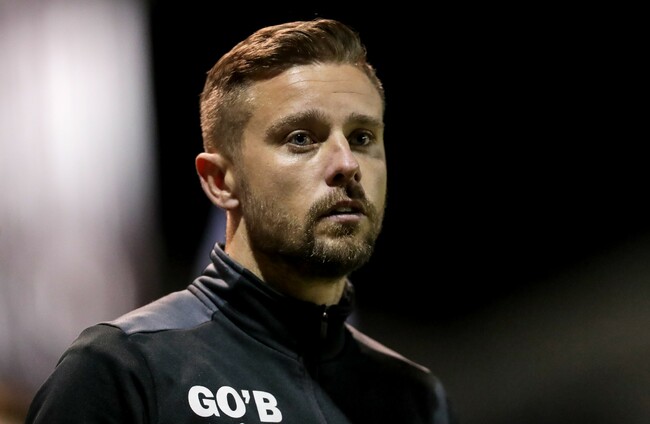A DEFINING CHARACTERISTIC of the old Football Association of Ireland was people’s fear of speaking critically of the way it was run.
Journalists, players and those working within the game often bore the brunt of the association’s wrath.
One example listed in the acclaimed ‘Champagne Football’ book by Mark Tighe and Paul Rowan is the case of Ruth Fahy.
The former Wexford Youths player, a columnist for the Daily Mirror and then-FAI employee, wrote a column backing the stance of the Irish women’s team during their protest against the association in 2017.
Knowing she would be reprimanded, Fahy immediately issued a letter of resignation, which was accepted.
She was far from the only person in football punished for speaking out. Consequently, many kept quiet in similar circumstances, for fear of losing their jobs.
The League of Ireland has endured a particularly torrid time over the past two decades, with a number of clubs, including Kilkenny City, Dublin City and Monaghan United, going out of business.
Several other teams, meanwhile, although staying afloat, have endured significant financial crises, with unpaid wages and player strikes among the recurring themes.
One person who has first-hand experience of these issues is Ger O’Brien. The Dubliner began his career in the League of Ireland in 2003, before finishing up in 2017. Of the seven clubs he represented, two are no longer part of the League of Ireland — Kildare County and Sporting Fingal.
O’Brien says he was not shocked when the various controversies in relation to the organisation began surfacing in 2019.
“I don’t think it came as a surprise to football people in Ireland,” he tells The42. “They always knew that something wasn’t right and the way things were being done wasn’t ethically correct.
I think what the two lads [Tighe and Rowan] have done in exploiting everything that has gone on [is commendable]. Getting that out there for the general public to see was a case of ‘wow’. I’m not even sure that John Delaney’s harshest critic could have believed exactly what was going on.
“It was all a bit crazy, how quickly it snowballed. It just took some very good old-fashioned journalists’ work to make sure that the story could be written in a way that nothing could come back on them.
“As we’ve seen from the book and the TV [programmes], anytime anything was going to be potentially written about, they were always blocked off.”
O’Brien is one of the many people who helped make ‘Champagne Football’ one of the best-selling books in Ireland this year, calling it “a fantastic read”.
“A lot of the stuff would make you shocked and disappointed at the way things were being done,” he adds.
“I know the book was very much about John Delaney and how he got into the position he got into and all the stories that have gone on through the years, but I was angry at the people around him that were allowing this to happen, that nobody was able to stand up as a group and it seemed to be a case of ‘we’ll just hide things and let it go’. That was the most frustrating for me.
“There were so many people in Abbotstown willing to protect the situation and so many people who were shielding the problems and hiding them and covering up stuff and doing other bits and pieces.
They just got caught in a rut with what was going on. I’ve had so many dealings in my position from player to now coach and to being involved with running an academy with many people in the FAI, from international managers to administrative staff. There are so many good people in there. You’d speak off the record to them and they’d clearly be able to tell you the ins and outs of what was going on and how embarrassing it was. But nobody could go public, because he was there for so long and wielded so much power that it would come back to them.”
St Patrick’s Athletic, the club that O’Brien is most closely affiliated with, having made over 100 appearances for them, were at one stage outspoken in their views on the FAI.
Pat’s, along with Derry, in 2016 turned down a €5,000 grant offered by the association, describing it as “crumbs from the rich man’s table”.
Part of the statement read: “The board of SPAFC wants its decision to serve as a clear message to the FAI that it has utterly failed in its responsibility to the domestic game and to those clubs who, in spite of its indifference, have managed to keep some semblance of professionalism within football in Ireland.”
“The League of Ireland hasn’t been run well, certainly in my time, between 15-20 years,” O’Brien says.
“The problem you had is that clubs relied on the FAI for a lot of things. If you go through each club, they would all have certain reasons why they would want to stay quiet on certain things.
“There was pushback on stadiums, training grounds, floodlights, a newly laid pitch, a new stand, anything like that, meant that nobody could actually come out and say anything.
“At the time when [news about the grant money] came out, every League of Ireland fan in the country bar none were basically shouting from the rooftops about this, but two clubs came out, and we were one of them. I was still playing at the time and I remember clearly coming back from Derry on the bus when the statement was made.
“It’s just one of those things that unfortunately, not enough people stood up from the League of Ireland.
“It’s no fault of their own, it’s just the way the league was being run in the last 20 years, the amount of infrastructure and money wasn’t there to be able to do things themselves and they had rely on the FAI for help.”
O’Brien, however, does not believe the association deserve most of the flak for clubs going out of existence.
“Others might say that, but 100% not from my point of view. Clubs have been run badly themselves and it’s very easy to point the finger at the FAI, to say ‘these allowed it to happen’. There should be a certain way that people who enter into a football club, which is a business, is run properly.
“Certain clubs went to the wall by mismanaging finances, gambling and other stuff like that, so we can’t point the finger completely at the FAI.
“The problem we have is that you’d expect somebody who’s looking after the whole thing to take a little more pride in what it has. I don’t think the product was valued. I don’t think they saw the value in it. And that’s just very unfortunate.
“We’ve rowed through some very tough years, certainly from 2008 to 2012, when we had the big crash and clubs that were on their knees. We’ve gone through that and we’ve also been through some prosperous years.
For me, the product on the pitch has got better, without a doubt. I don’t think the facilities around the place have generally got better. There are a handful of grounds that have improved, but it’s still something that if you weren’t a League of Ireland fan, or you weren’t involved with a club, if you went to a Richmond Park or a Ballybofey or anywhere like that, we all need to improve them.
“Would you want to go back into those stadiums? Away fans going to Dundalk for the first time, it’s just not being looked after well enough. We’ve always put finances into players rather than facilities and training grounds, which would have meant a much more lasting, stronger base for the clubs to be able to grow and develop the product a whole lot more.
“Yeah, the prize money is embarrassing. There’s no TV deal. When we went to summer football, I think it was very important to create a TV deal or create a product for ourselves with countries around the world who don’t work through the summer. We didn’t do that. I think we missed a big opportunity.
“The problem we have and we realise now — it’s not as if we’ve been siphoning money into other parts of the game, we just had no money whatsoever. We were borrowing from Peter to pay Paul.
“Eventually, it’s all caught up with us and it’s come crumbling down. I don’t know where that’s going to leave the FAI. Obviously there’s a new CEO [Jonathan Hill], I’m sure he knows warts and all what he’s walking into.
“He won’t be [ignorant] to any organisation as in League of Ireland or amateur clubs, schoolboys, PFAI or anyone like that. I think he just needs to come in, assess everything, make the best decisions and that’s what he’ll be judged on. I don’t think he’s really going to care about whose toes he stands on. And that’s what we probably need in this country at this moment in time — an outsider to come in and assess it and try to make decisions based on what he feels is best for football in this country.”
And despite everything that has gone on of late, O’Brien says he is optimistic about the future of the game in Ireland.
“We’ve gone through a very turbulent couple of years in football in this country. We have a manager [Stephen Kenny] who’s trying to change how we’re looked upon from the outside and how we view ourselves.
“We’ve got to adopt that approach ourselves and take it onboard and on the pitch, make sure we create the best plans we can.
Off the pitch, it’s not going to be easy. We’re not a big enough country, we’re not an attractive enough country to be able to bring in massive investment in terms of football. We’ve certainly got to try, and obviously now with a new man in charge, it’s about trying different things.
“For me, it’s a sad end to what could have been a successful era that turned out to be a nightmare. We’ve got to just dust ourselves down and face what’s going to come as a footballing country and try to get back.
“In fairness, the government have been fantastic so far in how they’ve treated all sports and I’d like to think that will continue, especially on our side of things with the domestic game and League of Ireland in regards stadiums and how we should think like that. The onus is on the clubs as well to get together and push forward, and not just wait on the FAI to produce teams. We’ve all got to put a shoulder to the door and see can we turn the tide a little bit, and get that good feeling back out there again.
“I think we need to keep going with our product here domestically. I’d love for the academies in the League of Ireland to be able to turn professional from an earlier age to start giving out scholarships, so kids aren’t worrying about trying to get to the UK at 16 or 17, and thinking that if it doesn’t happen, they failed.
“I’m not saying it’s going to be next year or the year after, but we do need to lay foundations and those young players coming up through the system now need to be able to feel that, even if I don’t go away or move on to a club in England, we do have a product here at home and I think they’re slowly starting to get that.”














Shelbourne ,Cork, Rovers, Drogheda, and Bray and Limerick this season all have had same problems in recent year’s….. The fai need to sort out their problem child once and for all
@Tony O Connor: Fai can’t be trusted to sort it out. Fans took control of Cork City and slowly but surely turned the club around,(From going to Derry with just 12 players, to the bus refusing to take them to Dublin for a game because bus company had’nt been paid).A few short years later look where they are now, League Champions and fai cup holders, playing in Champions League! Regular crowds between 4,000 and 6,000, (more for european games). What a turn around because of the fans taking control of their club and running it the way it should be run, not because of fai involvement.
@running man: great point about the fans controlling the club. Munich is 50% controlled by fan and it’s a massive success. Different situation I know but fans don’t want to make money and leave they want to make a good squad that competes for silverware every season
@Arry Ryan: all bundesliga clubs are majority owned by club supporter groups with the exception of one or two clubs who have found a way around the 50+1 “football clubs will not be allowed to play in the Bundesliga if commercial investors have more than a 49 percent stake”
Maybe the league should return to amateur status? There are only a few spectators at any game & there are only tiny TV or advertising revenues. The players are not generating enough income to pay their wages.
@Locojoe: You obviously haven’t been at a City match in Turners Cross.
@Locojoe: Its not up to the players to generate revenue, all they can do is go out and try to win. Its the owners of financial officer at bigger clubs who deal with finances.
@Locojoe: so your basically saying that clubs in league 2/1 over in England should go amateur right? Majority of clubs get small crowds over their, and then you look at cork averaging 5000, sham/dundalk averaging over 3000 and Sligo/pats averaging up and over 2000 people per game.
Yet your here laying into the LOI saying it should go “amateur” when the crowds have been improving year on year.
Limerick were getting 2 to 3 thousand at games last year , and then manager sacked , another left them in the lurch and joined a team back home , and said he was brought in to do a hatchet job , and was leaving the club in a good position , . Pat o Sullivan , who was never shy in speaking out , has for this past while stayed silent. The fai need to send in accountants / auditors to check their books , for a start .
With the battle between GAA and soccer for supporters and players along with our relatively small population very few clubs in this country will ever be on a stable footing. The advertising for games is non existant. The marketing from the club’s and FAI is appalling.
I have been an ireland season ticket holder for years and never once gotten an email about my nearest club which would be tallaght to ask about interest in going to club games. The game in Ireland is dead right now and without a complete new set of standards for clubs, financial and marketing it has no hope of surviving
@ChuckE: “I have been an ireland season ticket holder for years and never once gotten an email about my nearest club which would be tallaght to ask about interest in going to club games.”
You just explained perfectly why so many LoI fans wont go to Ireland games, why fund a sporting organisation when said organisation does literally nothing to improve its local league. Even an email which can be setup to be auto sent and they don’t even do that.
FAI are a joke. Sligo Rovers have to go 77 days without a home league fixture due to FAI planning. Imagine shutting a business for 77 days and expecting it to survive.
Anybody know what a typical wage at a club like Limerick might be?
@Jumperoo: some junior soccer players are getting more than some at limerick , another fai problem to solve? Without burying their heads in the sand?
You still need big financial backers and no amount of wind blowing up my ass is going to tell me that cork dont have big financial backers. No club on FANS ALONE funding it would survive in the LOI. Rumours of two groups looking for 100% ownership when the season finishes. As I said rumours.
@Trevor Beacom: Bohemians have been members-owned throughout their 128-year existence…
@Trevor Beacom: Cork City is 100% owned by the fans with no outside financial backing. FACT.